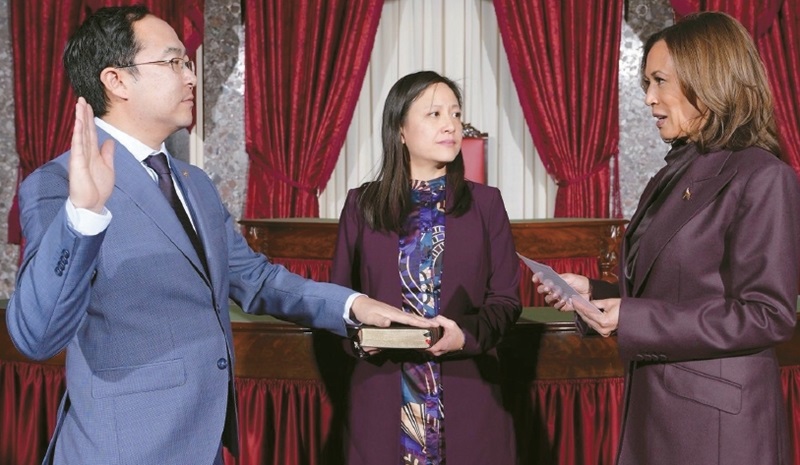The era of Korean-American U.S. Senators has officially begun, marking a significant milestone in the 120-year history of Korean immigration.
On December 9, Andy Kim, who was elected as a U.S. Senator from New Jersey in the November 5 election, took the oath of office, officially assuming his role as a U.S. Senator. In his early 40s, Kim had previously served three terms as a U.S. Representative.
The swearing-in ceremony, presided over by Vice President Kamala Harris in her capacity as President of the Senate, took place at 5 p.m. (Eastern Time) in the U.S. Senate chamber. During the ceremony, Kim pledged to protect the nation and serve as a dedicated public official for the people.
Although the official swearing-in date is typically January 3, New Jersey Governor Phil Murphy appointed Kim early to fill the vacant Senate seat, allowing the ceremony to be held ahead of schedule.

With this milestone, Kim becomes the first Korean American to serve as a U.S. Senator. The precedent was set in 1993 when Kim Chang-jun (Jay Kim) became the first Korean American member of Congress as a Representative from Diamond Bar, California. In 2019, Andy Kim followed as a U.S. Representative and has now made history again as the first Korean American to enter the Senate. His term will last six years.
Born in Boston in 1982, Kim graduated from the University of Chicago and later earned a degree from Oxford University. He went on to work for the U.S. State Department and served as a National Security Advisor in the White House during the Obama administration.
Kim first drew national attention on January 6, 2021, when images of him quietly cleaning up the debris left in the U.S. Capitol following the insurrection were broadcast by the media. Reflecting on his actions, he stated, “I have worked for America, which gave me and my family opportunities. What I can do right now is quietly clean up the mess left behind in my workplace, the Capitol.” He added, “I am sure I am not the only one feeling this pain.” His blue suit from that day was later donated to the Smithsonian Museum, where it became a symbolic artifact.
Kim’s path to the Senate began last fall when then-Senator Bob Menendez of New Jersey was indicted on charges of working on behalf of a foreign government. In response, Kim criticized Menendez and announced his candidacy for the Senate — a bold move, given his low name recognition in New Jersey at the time. Despite the odds, Kim took on the challenge of running against a senior politician from his own party. As his Democratic competitors dropped out, Kim emerged as the frontrunner.
In the general election, Kim faced Republican candidate Curtis Bashaw, a wealthy hotel industry executive. Kim secured a decisive victory, winning by a margin of 10 percentage points.
After his victory was confirmed, Kim told the Korea Daily in an interview, “It was a battle I couldn’t have won without the support and backing of the Korean-American community nationwide.” He also expressed his hopes to “strengthen cooperation with Korea and contribute to the development of the Korean-American community.”
Following his swearing-in on December 9, Kim remarked, “It is overwhelming to have the opportunity to serve at a time of uncertainty for America. I promise to never lose myself during my term, to never let the work change me, and to work to change the work I do.”
As a U.S. Senator, Kim will have the authority to participate in the confirmation of key executive branch officials, including Supreme Court justices and Cabinet members, through Senate confirmation hearings.
In the November election, the Republican Party secured 53 seats in the Senate, while the Democratic Party, to which Kim belongs, won 45 seats. The remaining two seats are held by independent members.
With the White House, Senate, and House of Representatives all under Republican control, Kim is expected to be a strong voice on foreign affairs and national security as a member of the opposition party. Although his Senate committee assignments have not yet been finalized, his prior experience on the House Armed Services Committee (focusing on cybersecurity and military personnel) and the House Foreign Affairs Committee (focusing on the Indo-Pacific region) suggests he is likely to continue working on related committees in the Senate.
BY BRIAN CHOI [ichoi@koreadaily.com]




